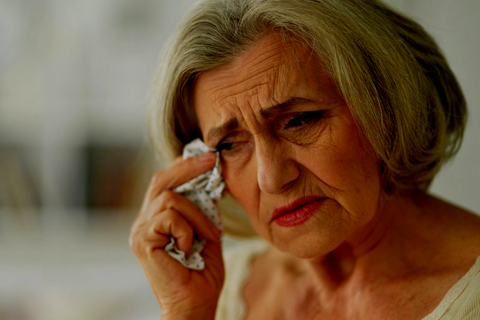
This article explores the impact of aging on vision as well as common eye conditions such as presbyopia, macular degeneration, and dry eyes. There are helpful suggestions for decreasing digital eye strain, promoting eye health through dietary and lifestyle changes, and understanding how smoking and heredity affect your eyes. Explore the value of routine eye exams, excellent eye care practices, and establishing an environment at home that is eye-friendly. Find out how simple actions, such as a balanced diet and regular exercise, can help you maintain good vision for the rest of your life.

As we go through life, our eyesight changes, and some vision problems increase in frequency as we get older. Our eyes are vulnerable to strain and potential problems due to the everyday use of digital devices as well as the aging process itself. However, by being aware of these difficulties and putting some simple procedures into practice, you can make sure that your eyes stay young and healthy well into old age. Here are the most common eye-related problems:
Presbyopia,
Frequently referred to as age-related nearsightedness.
Presbyopia begins to affect our lives beyond the age of 40, making it challenging to read small print and concentrate on tasks that require close-up work. Consider wearing glasses or contacts that are specifically made for presbyopia to combat this. Ask your eye doctor about surgical options if you’d like something more long-lasting.

Age-Related Macular Degeneration (AMD)
AMD, which damages central vision, often develops after age 50. Early warning symptoms can be detected with regular monitoring utilizing equipment like the Amsler grid at home. Supplements and dietary changes can help slow down the growth of AMD. Remember that quick action is essential for maintaining your vision, so contact your eye doctor if any changes are noticed.
Dry Eyes
As we grow older, tear production decreases, which frequently results in dry eyes. This may cause discomfort or possibly eyesight blur. Artificial tears are available and can help, although versions without preservatives are preferred. Consult an eye doctor if you have persistent dry eyes, since they may advise treatments like Punctal plugs.
Glaucoma
The term “glaucoma” refers to a set of disorders that can harm the optic nerve and impair vision, usually because of elevated eye pressure. Regular eye exams are essential for early detection because glaucoma typically develops without symptoms. Even though glaucoma can permanently damage eyesight, immediate treatment can stop it from getting worse.
Cataracts
Cataracts can result in blurry, fading vision in elderly people. Temporary relief can be obtained by changing one’s lifestyle and getting new eyeglass prescriptions. However, surgery to remove cataracts is frequently the most practical remedy that restores eye clarity and improves general quality of life.
Other Vision Changes Related to Aging
Aside from certain situations, aging eyes may have difficulty differentiating colors, become more sensitive to glare, and require lighters. Even though these changes are typical, it is advised that you visit your eye doctor if they are affecting your normal daily activities. They can spot these changes and take appropriate action, helping you maintain clear vision.
Protecting the Health of Your vision
Adopting a preventative approach to eye health can significantly alter things. Include these routines in your day-to-day activities:
Nutrition for Eye Health:
Providing your eyes with enough nutrients can have a significant impact. Omega-3 fatty acids from fish and flaxseeds, lutein and zeaxanthin from spinach and kale, and vitamin A from carrots all help to support your vision. Including these things in your diet will help you keep your vision clear.
Lifestyle Modifications:
Maintaining an active lifestyle benefits your eyes as well as your body. Your eyes have better blood flow when you work out regularly. Maintaining a healthy weight and controlling long-term diseases like diabetes can help protect your vision. Keep yourself moisturized to avoid dry eyes.
Smoking and Eye Health
Smoking can harm your eyes; did you know that? Age-associated macular degeneration and cataracts both become more likely as a result. Quitting smoking might considerably enhance your eye health if you currently smoke. Refuse to smoke to safeguard your vision.
The role of genetics
Although not everything is under the control of genes, they can affect eye health. Taking preventative measures, like eating healthy and wearing eye protection, can lessen the effects of inherited variables. Even if you have a family history of eye problems, adopting healthy behaviors can still help.
Importance of Regular Eye Exams:
Regular eye exams are crucial because they serve as preventative maintenance for your vision. A thorough eye exam can identify problems early, even if you are unaware of them. By doing this, you can make sure that you get immediate treatment and maintain the health of your eyes.
Hygiene and Eye Safety:
Simple routines can keep your eyes safe and healthy. To avoid infections, always wash your hands before touching your eyes. Apply the right procedures when taking out and caring for your contact lenses. If you like sports or other potentially dangerous activities, shield your eyes with protective equipment.
Role of Sleep in Eye Health:
The key to healthy eyes is getting adequate sleep. Your eyes may relax and rehydrate while you sleep. Additionally, getting quality sleep lessens the likelihood of waking up with painful, dry eyes. For total eye comfort, make quality sleep a priority.
Advanced Treatment Options For Healthy Vision:
Modern technology has made it possible for us to access innovative treatments. Laser eye surgery provides a remedy for age-related problems like presbyopia. With new methods and unique lenses, cataract surgery has also advanced. To investigate these possibilities for sharper eyesight, speak with your eye doctor.
Holistic Approaches
Have you heard of eye yoga? Simple exercises can ease strain and relax the eye muscles. Deep breathing exercises and meditation are also beneficial for your eyes. Your eye health can be improved by incorporating these holistic practices into your daily routine.
Taking Care of Aging Eyes at Home
The environment at home has an impact on eye health. To avoid strain, use the correct illumination. Choose ergonomic furniture and set up your workstation to minimize glare. These minor adjustments create a comfortable environment for your eyes.
Community Support and Resources
On your journey to eye health, you are not alone. Online discussion boards and community support groups offer a venue for exchanging views and experiences. Making connections with people who are going through similar things can bring comfort and useful guidance.
Spread Awareness
Share this eye-opening article with your loved ones. It is vital to raise public awareness of eye health. You can contribute to the development of a society that values vision wellness by encouraging friends and family to take care of their eyes.
Read Also: Conquer Monsoon Seasonal Eye Allergies: Practical Tips for Seasonal Relief
Read Also: Healthy Vision Tips
How can I reduce screen-related digital eye fatigue?
Try the “20-20-20” rule, which instructs you to look at anything 20 feet away for 20 seconds every 20 minutes.
Are there at-home natural remedies for aging eyes?
Absolutely! Your eyes are nourished by foods like salmon, spinach, and carrots. Regular exercise increases the blood flow to your eyes, and getting enough sleep is good for your eyes. Additionally, infections can be avoided by practicing proper hygiene, such as washing your hands before touching your eyes.
What is presbyopia, and why does it develop as we age?
Age-related farsightedness, called Presbyopia, makes it more difficult to focus on close objects. Because our eye lens loses flexibility with age, it becomes widespread after age 40. Reading menus or text messages on a phone becomes more difficult because of this.
Can I prevent age-related macular degeneration (AMD)?
Healthy practices can help, even though prevention cannot be guaranteed. Consuming antioxidant-rich meals and shielding your eyes from UV rays may reduce the risk. Regular eye exams identify early warning symptoms and enable prompt intervention if AMD is found.








